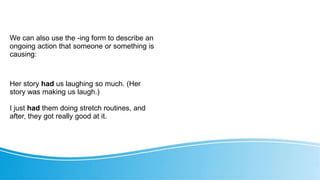Have something done
- 1. Have something done Done by Abdullah Alhumam and Mishaal Almulhim
- 2. What someone does for us We use: have + object + v3 form when we talk about someone doing something for us which we ask or instruct them to do. It emphasises the process/action rather than who performs it: We’re having the house painted next week. (We are not going to paint the house ourselves. Someone else will paint it. The emphasis is on the fact that the house is being painted rather than who is doing it.)
- 3. comparison I had my hair cut Someone cut my hair I’ve cut my hair. I’d cut my hair. I cut my own hair. comparison
- 4. We can also use have + object + v3 form when something bad happens, especially when someone is affected by an action which they did not cause They’ve had their car stolen. (‘They’ are affected by the action of the car being stolen but they did not cause this to happen.) Hundreds of people had their homes destroyed by the hurricane. (Hundreds of people were affected by the hurricane, which they did not cause.)
- 5. Asking or instructing We use the pattern have + object + infinitive without to when we talk about instructing someone (underlined) to do something. We use it to emphasise who performed the action: I’ll have Harry book you a taxi. (I will instruct Harry to book a taxi for you. Emphasis is on who will do the action more than on the action.) He had Kay make us all some tea.
- 6. Talking about experience We use have + object + -ing form or infinitive without to to talk about an event or experience. We use the -ing form for an event in progress and the infinitive without to for a completed event: We had a man singing to us as we sat in the restaurant having our meal. We had a strange woman come to the door selling pictures.
- 7. We can also use the -ing form to describe an ongoing action that someone or something is causing: Her story had us laughing so much. (Her story was making us laugh.) I just had them doing stretch routines, and after, they got really good at it.






